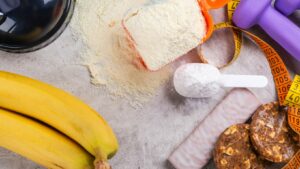Running Sports Nutrition
- Prioritize Carbohydrates: Carbohydrates are the primary fuel source for runners, constituting 60-70% of total caloric intake. Focus on complex carbs like whole grains, fruits, and vegetables for sustained energy.
- Incorporate Lean Proteins: Adequate protein intake (1.2-2.0 grams/kg of body weight) is essential for muscle repair and recovery. Include lean sources such as chicken, fish, and legumes, particularly after workouts.
- Maintain Healthy Fats: Healthy fats should comprise 20-35% of a runner’s diet. Sources like avocados, nuts, and olive oil provide long-lasting energy and essential fatty acids.

- Stay Hydrated: Proper hydration is crucial for performance. Runners should drink fluids before, during, and after runs, aiming for 500-700 milliliters of water pre-run and 150-350 milliliters every 15-20 minutes during long runs.
- Timely Nutrition Matters: Consume easily digestible carbs 1-3 hours before running and a balanced meal of carbs and protein within 30 minutes post-run to enhance performance and recovery.
- Avoid Common Pitfalls: Watch out for frequent nutrition mistakes, such as neglecting carb intake, skipping meals, ignoring post-run nutrition, and overemphasizing protein while disregarding healthy fats.
For runners, nutrition plays a crucial role in performance and recovery. Whether training for a marathon or enjoying a casual jog, what athletes fuel their bodies with can make all the difference. Understanding the right balance of carbohydrates, proteins, and fats not only enhances endurance but also aids in muscle repair and energy replenishment.
As the popularity of running continues to rise, so does the need for effective sports nutrition strategies. From pre-run snacks to post-workout meals, every choice influences their ability to perform at their best. This article explores essential nutrition tips tailored for runners, ensuring they maximize their potential on the track or trail.
Overview Of Running Sports Nutrition
Running sports nutrition plays a crucial role in optimizing performance and aiding recovery for runners. Key components include:
- Carbohydrates: Carbs serve as the primary fuel source during running. Runners should focus on complex carbohydrates like whole grains, fruits, and vegetables to sustain energy levels.
- Proteins: Proteins facilitate muscle repair and recovery. Runners benefit from lean protein sources, such as chicken, fish, beans, and legumes, especially post-exercise.
- Fats: Healthy fats, found in nuts, seeds, and avocados, provide essential fatty acids and support prolonged energy needs for endurance running.
Effective hydration is equally essential. Runners must consume fluids before, during, and after exercise to maintain performance and prevent dehydration.
Strategies for timing meals also matter. Pre-run meals, rich in easily digestible carbs, should occur about 1-3 hours before running. Post-run nutrition, containing a mix of carbs and proteins, is vital within 30 minutes to support recovery.
By adhering to these guidelines, runners can enhance their training outcomes and overall athletic performance.
Essential Nutrients For Runners
Runners require a balance of essential nutrients to optimize performance and support recovery. Focusing on carbohydrates, proteins, and fats ensures adequate energy levels and muscle repair.
Carbohydrates
Carbohydrates serve as the primary energy source for runners. Complex carbohydrates, such as whole grains, fruits, and vegetables, provide sustained energy. Runners should aim for 60-70% of their total caloric intake from carbohydrates. For example, a pre-run meal could include oatmeal topped with bananas or a whole grain wrap filled with vegetables. Consuming 1-3 grams of carbohydrates per kilogram of body weight 1-3 hours before running maximizes glycogen stores.
Proteins
Proteins support muscle repair and recovery after intense running sessions. Lean protein sources, such as chicken, fish, eggs, dairy, and legumes, contribute essential amino acids. Runners require approximately 1.2-2.0 grams of protein per kilogram of body weight daily to maintain muscle health. Including a protein-rich snack or meal, like Greek yogurt or a protein shake, within 30 minutes post-run aids recovery.
Fats
Healthy fats provide long-lasting energy and support overall health. Sources like avocados, nuts, seeds, and olive oil are excellent choices for runners. Fats should make up 20-35% of a runner’s diet, with emphasis on unsaturated fats. Including fat in meals helps runners sustain energy for prolonged activities. For instance, adding nut butter to smoothies or salads can offer both flavor and nutrition.
Hydration Strategies For Runners
Hydration plays a crucial role in a runner’s performance and overall health. Proper fluid intake aids in temperature regulation, cardiovascular function, and nutrient transport during exercise.
Importance Of Hydration
Hydration affects endurance, strength, and recovery. Dehydration can lead to fatigue, muscle cramps, and decreased performance. Runners should aim to drink enough fluids before, during, and after runs to maintain optimal hydration levels. Specific guidelines recommend consuming 500-700 milliliters of water 2-3 hours before running, followed by 200-300 milliliters just before starting. During runs longer than 60 minutes, intake should range from 150-350 milliliters every 15-20 minutes. Post-run recovery involves replenishing lost fluids, targeting 1.5 liters of water for every kilogram of body weight lost during exercise.
Electrolyte Replacement
Electrolytes, such as sodium, potassium, and magnesium, are vital for muscle function and fluid balance. Runners lose electrolytes through sweat, especially during intense or prolonged efforts. To replace electrolytes, consuming sports drinks or electrolyte tablets during workouts can be beneficial. A general recommendation is to include 400-700 milligrams of sodium per liter of fluid, particularly in races or extended training sessions. Foods rich in electrolytes, like bananas, oranges, and nuts, also support recovery and hydration.
Fueling Before, During, And After Runs
Nutrition plays a crucial role in optimizing running performance and recovery. Proper fueling strategies ensure that runners maintain energy levels and promote muscle repair throughout their training regimen.
Pre-Run Nutrition
Pre-run nutrition is vital for energy and performance. Runners should consume easily digestible carbohydrates 1-3 hours before a run. Ideal options include:
- Bananas: Offer quick energy due to natural sugars.
- Oatmeal: Provides complex carbs for sustained energy release.
- Whole grain toast with honey: Combines fast-acting carbs with fiber for stability.
Aiming for a meal that includes 30-60 grams of carbohydrates helps maximize glycogen stores. Runners should also consider hydration, drinking 16-20 ounces of water prior to running to stay adequately hydrated.
During-Run Nutrition
During longer runs, maintaining energy levels is essential. Runners can utilize the following strategies:
- Sports gels: Provide 20-30 grams of carbohydrates for quick energy.
- Chews or gummies: Easy to digest and convenient for quick access.
- Electrolyte drinks: Replace lost fluids and minerals, aiming for one serving per hour of exercise.
Consuming carbohydrates at roughly 30-60 grams per hour can enhance endurance and delay fatigue. Hydration is crucial here as well; maintaining a fluid intake of 7-10 ounces every 10-20 minutes during activity mitigates the risk of dehydration.
Post-Run Recovery
Post-run recovery nutrition supports muscle repair and replenishes energy stores. Runners should consume a meal rich in both carbohydrates and protein within 30 minutes of finishing. Ideal combinations include:
- Greek yogurt with fruit: A balance of protein and carbs.
- Chocolate milk: Offers a ratio of 3:1 carbs to protein for optimal recovery.
- Quinoa salad with beans: Provides plant-based protein alongside carbohydrates.
Aiming for 1.2 grams of carbohydrates and 0.25-0.3 grams of protein per kilogram of body weight aids recovery the most effectively. Hydration remains important post-run; consuming 16-24 ounces of fluid for every pound lost during exercise helps restore hydration levels.
Common Nutrition Mistakes To Avoid
Runners often make several common nutrition mistakes that hinder performance and recovery. Identifying these pitfalls can lead to better dietary choices and improved athletic outcomes.
- Neglecting Carbohydrate Intake
Carbohydrates serve as the main energy source for runners. Reducing carb intake can lead to fatigue and decreased performance, especially during long runs. Prioritizing complex carbs like whole grains, fruits, and vegetables is essential.
- Skipping Meals
Meal skipping can disrupt metabolism and energy levels. Consistent meal schedules support sustained energy. Eating at regular intervals throughout the day maintains optimal performance.
- Ignoring Post-Run Nutrition
Failing to consume a recovery meal can hinder muscle repair and glycogen restoration. Aim for a meal rich in carbohydrates and proteins within 30 minutes of finishing a run. Options include Greek yogurt with fruits or a shake made with chocolate milk.
- Not Staying Hydrated
Dehydration negatively affects performance and recovery. Runners should drink fluids before, during, and after exercise. Following guidelines for fluid intake ensures adequate hydration levels.
- Overconsuming Supplements
 Relying too much on supplements can lead to imbalances. Whole foods provide essential nutrients better than pills. Prioritize nutrient-dense foods over supplements whenever possible.
Relying too much on supplements can lead to imbalances. Whole foods provide essential nutrients better than pills. Prioritize nutrient-dense foods over supplements whenever possible.
- Disregarding Individual Needs
Every runner’s nutritional needs differ based on age, gender, weight, and training intensity. Customizing a nutrition plan to fit individual requirements ensures optimal performance.
- Focusing Solely on Protein
While protein is crucial for muscle repair, overemphasizing it can lead to neglecting other vital nutrients. A balanced diet includes carbohydrates, fats, vitamins, and minerals for overall health.
- Timing Issues
Improper timing of meals and snacks can impact energy levels and recovery. Pre-run meals should consist of easily digestible carbs 1-3 hours before running, while post-run nutrition should occur within 30 minutes.
- Underestimating the Role of Fats
Healthy fats are essential for prolonged energy and nutrient absorption. Incorporating sources like nuts, seeds, and avocados enhances overall nutrition without excess calories.
By acknowledging and avoiding these nutrition mistakes, runners can enhance their training results and overall athletic performance.
Enjoy Every Mile on the Road
Understanding the role of nutrition and hydration in running is crucial for any serious athlete. A well-rounded diet not only fuels performance but also aids in recovery. By prioritizing carbohydrates, proteins, and healthy fats along with proper hydration strategies, runners can significantly enhance their endurance and overall health.
Avoiding common nutrition pitfalls can make a substantial difference in achieving fitness goals. Tailoring nutrition plans to individual needs ensures optimal energy levels and recovery. With the right approach to sports nutrition, runners can unlock their full potential and enjoy every mile on the road.

